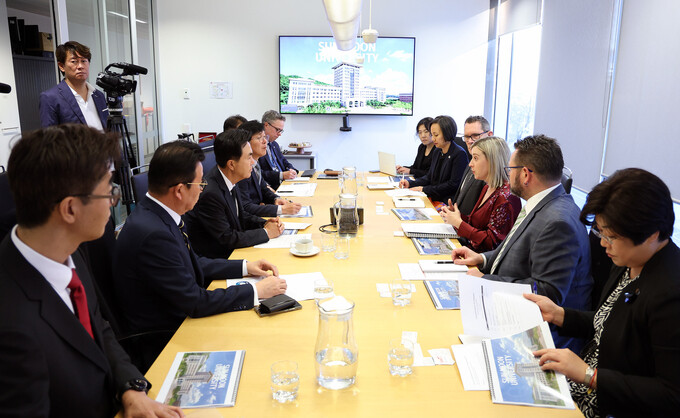
ADELAIDE, Australia – Educational exchange and cooperation between Chungcheongnam-do and universities in South Australia are expected to significantly expand. Chungcheongnam-do Governor Kim Tae-heum, currently visiting Australia to explore overseas markets, attended an education roundtable at Study Adelaide in South Australia on May 29th and pledged to strengthen educational cooperation between the two regions.
The roundtable was attended by Governor Kim Tae-heum and his delegation, Sun Moon University President Moon Sung-je, Study Adelaide CEO Jane Johnston, and about 20 other education officials, who engaged in in-depth discussions.
Study Adelaide is an organization dedicated to attracting and supporting international students, operated in collaboration with the South Australian state government and 50 educational institutions, including the University of Adelaide. It supports international students with their studies, daily life, and employment, playing a pivotal role in establishing South Australia as a global education hub.
The University of Adelaide, a prominent national university, garnered attention at the meeting. Established in 1874, it boasts a proud tradition as the third oldest university in Australia, after the University of Sydney and the University of Melbourne. It is a member of the Group of Eight (G8), Australia's leading research-intensive universities, and consistently ranks among the top 100 universities worldwide. Of its 29,000 students, 30% are international students. The university has a progressive history, being the first Australian university to admit female students and to introduce studies in science and business. It has produced five Nobel laureates, including Sir Howard Florey, who contributed to the development of penicillin. The university is particularly competitive globally in medicine and veterinary medicine, offering extensive clinical practice opportunities.
During the roundtable, Sun Moon University proposed specific cooperation measures, including operating student exchange programs, implementing short-term study tour programs, recognizing dual degrees, and pursuing joint research projects between the two universities. Sun Moon University already enhances students' global competencies through its 'Sun Moon Global FLY program,' which offers various overseas dispatch programs such as short-term language training, short-term experiential training, major-specific training, and long-term training. This initiative supports students in gaining practical learning and experiential opportunities abroad through active exchanges with various countries, including Australia.
Governor Kim Tae-heum introduced the background of his visit to South Australia and Chungcheongnam-do's university support policies, emphasizing that "among human and material exchanges with foreign countries, education is the most important exchange for sharing the future." He also urged Sun Moon University and Study Adelaide to achieve tangible results through concrete discussions and promised Chungcheongnam-do's active support.
Chungcheongnam-do is actively promoting university support policies for regional innovation and growth. In particular, through the 'Regional Innovation-Centered University Support System (RISE) Project,' the province is delegating some of the government-led administrative and financial support authority for universities to local governments, thereby fostering talent development and technology advancement necessary for regional development. Along with customized employment and startup support programs such as the Chungnam-type Youth Intern for Work Experience and the Youth Hope Connection Project, the province is focusing on nurturing innovative talent linked to region-specific industries, such as supporting Hoseo University's operation as a startup-focused university and Konyang University's development of K-Defense industry convergence talent. This aims to encourage young people to settle in the region and achieve co-prosperity between the region and universities.
The expansion of educational exchange between Chungcheongnam-do and South Australia aligns with the active trend of educational cooperation between South Korea and Australia. Recently, a successful training visit for Australian primary and secondary school principals to Korea concluded, and the two countries continue discussions on introducing and revitalizing IB education and exchange, thereby deepening mutual understanding, sharing policy experiences, and broadening the scope of cooperation in education. The strengthened educational cooperation between Chungcheongnam-do and South Australia is expected to significantly contribute to fostering the global competencies of future generations and to the mutual development of both regions.
[Copyright (c) Global Economic Times. All Rights Reserved.]






























